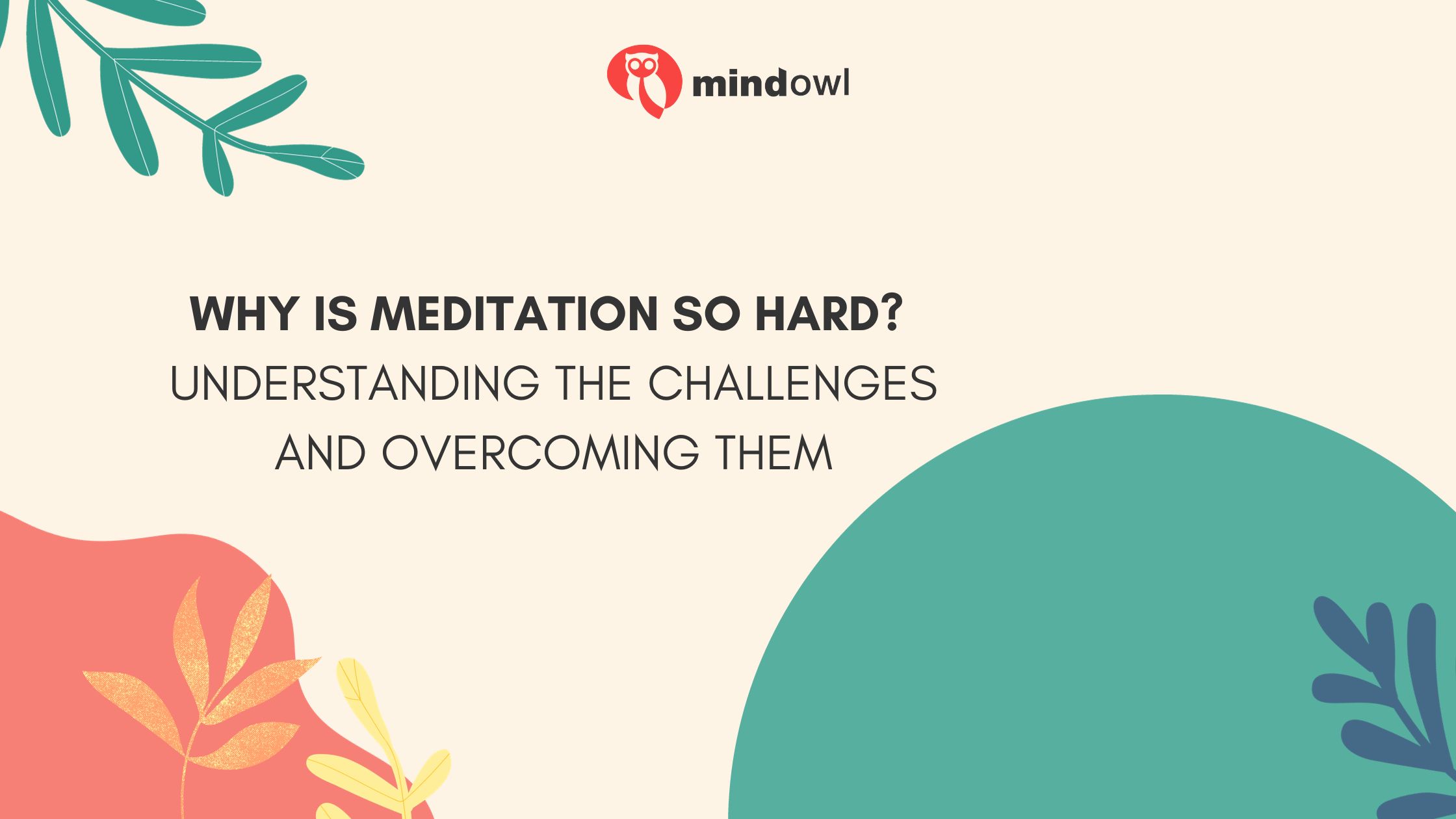
Have you ever felt that no matter how hard you try, meditation just doesn’t seem to work for you? You’re not alone; many find it difficult to quiet their busy minds and sit still. This article will delve into the challenges of meditation and offer practical advice for overcoming them, making your practice more rewarding.
Discover the path to a clearer mind.
Key Takeaways
- Some people think meditation is too hard because their minds are always filled with thoughts and life is very busy, but starting off slowly can help.
- Meditation does not have to be sitting in silence for a long time; there are many ways to do it, like walking or guided sessions. Finding what suits you best can make it easier.
- Our brains sometimes find it difficult to be still during meditation due to how they work, but knowing this can help us to be calm and patient with ourselves as we learn.
Common Challenges with Meditation

Many of us struggle with busy minds, misinformation about meditation, difficulty finding the right approach or technique, and biological and psychological barriers. It’s important to understand these challenges and how they may impact our meditation practice.
Busy minds and competing demands on our time
Our heads are like busy streets, full of thoughts rushing by like cars. We try to meditate, but it feels like we’re standing in the middle of traffic, trying not to get hit by our own ideas.
It’s hard! Life also asks a lot from us. Jobs, families, and chores fill up our days. Finding time to sit quietly can seem as tough as finding a lost toy in a messy room.
We know we should make time for meditation because it’s good for us. But often, we feel there just aren’t enough hours in the day. Our phones beep with new messages; there’s always more work or another dish to wash.
It makes sitting still and watching our breath seem impossible sometimes! But even with all this going on, taking even a short break to breathe and be calm can help us handle everything else better.
Misinformation about meditation
Many people think meditation is too hard or that it takes years to get good at it. But this isn’t true. You can start feeling the benefits of meditation right away, even if you’re new at it.
The idea that you need lots of practice before meditation works is one of the many wrong things people hear about it. Some folks believe there’s only one right way to meditate or that you must sit in silence for hours.
This isn’t correct either! There are many types of meditation, and finding the one that suits you best can make a big difference.
Others may tell you that meditation means stopping all thoughts. Trying to do this can be very frustrating because our minds naturally like to think! Meditation is more about noticing your thoughts and not holding onto them tightly, rather than making your mind blank.
With these truths in hand, we’re ready to face other reasons why sitting down to meditate might feel tough sometimes.
Difficulty finding the right approach or technique
Meditation can feel like trying to find the perfect key for a tricky lock. There are so many types of meditation that it’s easy to get lost in which one to choose. Some people enjoy sitting still and focusing on their breath, while others might prefer moving meditations like walking or yoga.
It’s normal to try a few different techniques before finding the one that feels right. Think about it this way: just as each person is unique, so too is their path to relaxation and mindfulness.
It helps to know there isn’t just one right way to meditate. You don’t need special skills or have to sit in silence for hours. Instead, listen to your body and mind, and take small steps towards peace and awareness.
If guided meditation makes you feel comfortable, give it a go; if quiet time alone works better for you, then do that instead. Remembering not every method suits everyone leads us closer to our own best practice – where calmness and clarity await us all.
Biological and psychological barriers
Our own bodies and minds can set up roadblocks that make sitting still and clearing our thoughts tough. Sometimes, our brains just love to think, creating a non-stop stream of ideas and worries.
This chatter in our head can be hard to silence when we try to meditate. We might also feel physical discomfort or an itch to move around, which distracts us from calming down.
Learning about these hurdles helps us tackle them better. It’s normal for the mind to wander or for the body to resist being quiet and still; it’s a part of who we are. By knowing this, we can be kinder to ourselves as we practice meditation and seek ways that help us ease into a peaceful state despite these challenges.
Brainwave states and the role of the Default Mode Network
Our brain has different wave states, like alpha and theta waves, which make us feel relaxed. When we meditate, these wave states can change to help us find calmness. The Default Mode Network in our brain is a special place that gets more active when we are not focusing on anything specific.
It’s like the home base of our mind where thoughts about ourselves often happen.
Meditation makes this network less busy. This helps us stop worrying so much about ourselves and problems that may not be happening right now. Different ways of meditating have different effects on the brain networks and functions.
Knowing how meditation works with our brainwaves and the Default Mode Network can help us deal with challenges when learning to meditate.
Why We Struggle with Meditation

Many of us struggle with meditation due to a fear of facing difficult emotions, resistance to change, and difficulty being present and staying focused. It’s important to acknowledge these challenges as part of the process and work on overcoming them with compassion and understanding.
Fear of facing difficult emotions
Meditation can bring up strong feelings we might not want to face. Sometimes, when we sit quietly, emotions like sadness, anger, or fear come up. It’s like our minds are used to running around all day and then suddenly they have to be still.
This can feel scary because we’re not always taught how to handle these big emotions.
We don’t need to fight these feelings during meditation. Mindfulness helps us look at them in a new way. Instead of trying to push them away or hold on too tight, it teaches us just to notice what’s happening inside.
With practice, this can make dealing with tough feelings a bit easier and less scary each time.
Resistance to change
Fear of facing tough feelings is just one thing that makes meditation a challenge. Another big hurdle can be our own resistance to change. We’re creatures of habit and often like things to stay the same.
Trying something new, like meditation, means we have to adjust how we think and act, which isn’t always easy.
We might tell ourselves stories about why we can’t meditate. We may believe it’s too hard or feel silly sitting still and doing nothing. But these negative thoughts are just barriers we create in our minds.
To get past them, we need to spot these beliefs and understand they aren’t helping us. It’s important to trust the process of meditation and give it time before deciding if it’s right for us or not.
Difficulty with being present and staying focused
When it comes to meditation, one of the common struggles we face is the difficulty in being present and staying focused. Our minds tend to wander, jumping from one thought to another, making it challenging to anchor ourselves in the present moment.
This restlessness often leads to feelings of frustration and discouragement as we try to cultivate a sense of mindfulness. The overactive nature of our minds, darting between past regrets and future worries, can hinder our ability to fully immerse ourselves in the practice.
Staying focused during meditation can be particularly tough for those who lead busy lives with countless demands vying for their attention. Additionally, the natural urge to rush through tasks may permeate into our meditation practice, making it harder to slow down and truly embrace each mindful moment without feeling hurried or distracted.
Overcoming Challenges in Meditation
To overcome the challenges in meditation, it’s important to practice self-compassion and kindness towards our minds, identify and address subconscious thoughts and beliefs, and incorporate mindfulness into daily life.
These strategies can help create a more balanced and sustainable meditation practice.
Practising self-compassion and kindness towards our minds
Practising self-compassion and kindness towards our minds is a crucial aspect of overcoming the challenges in meditation. It involves being gentle with ourselves, acknowledging our struggles without judgment, and offering understanding during difficult moments.
By showing ourselves the same care and compassion we would offer to a friend facing similar difficulties, we can cultivate resilience and build greater self-awareness. Research shows that higher levels of self-compassion are linked to better mental health scores, improved relationships, and decreased anxiety.
Embracing self-kindness allows us to navigate the hurdles in meditation with patience and empathy, ultimately leading to a more fulfilling practice.
Incorporating mindfulness into daily life is an effective way to extend self-compassion beyond formal meditation sessions. This helps us become more attuned to our thoughts and emotions throughout the day, fostering a kinder relationship with our minds as we face various challenges.
Identifying and addressing subconscious thoughts and beliefs
When we practise self-compassion and kindness towards our minds, it becomes easier to identify and address subconscious thoughts and beliefs. By offering ourselves patience and understanding, we create a safe space to explore the patterns of our inner dialogue.
Through mindfulness meditation, we can observe these thoughts without judgment, recognising their influence on our emotions and behaviours. This allows us to gradually challenge and reframe limiting beliefs, fostering a more positive mental environment that supports our well-being.
Incorporating mindfulness into daily life helps us become more aware of the subconscious narratives that shape our experiences. Recognising these automatic thought processes enables us to actively replace negative or limiting beliefs with affirming ones, promoting healthier cognitive patterns that support personal growth and emotional resilience.
Incorporating mindfulness into daily life
Incorporating mindfulness into our daily routine doesn’t have to be complicated. Simple activities like taking a few moments to focus on our breath while waiting in line, or paying attention to the sensations while washing dishes can bring mindfulness into everyday life.
Engaging fully in each moment and being present with whatever we are doing can help us cultivate mindfulness without adding more tasks to our already busy schedules. By integrating mindful awareness into ordinary activities, we can gradually experience the benefits of reduced stress and improved emotional regulation throughout the day.
Mindfulness practice is not only about formal meditation sessions; it’s about infusing moments of awareness into all aspects of our lives. We don’t need special equipment or a quiet room – just an intention to be present with whatever arises throughout our day.
Benefits of Meditation
Experience reduced stress and anxiety, improved emotional regulation, and increased self-awareness and self-compassion through regular meditation practice. To learn more about overcoming the challenges of meditation, continue reading our blog!
Reduced stress and anxiety
Meditation offers a powerful solution to reduce stress and anxiety in our daily lives. Research has shown that engaging in regular meditation can lead to a significant decrease in stress levels, ultimately resulting in lower levels of anxiety.
The practice of meditation allows us to cultivate a sense of inner peace and calm, providing us with the tools needed to manage the stresses of everyday life effectively. By incorporating mindfulness and meditation into our routine, we can experience improved emotional regulation, leading to a greater sense of overall well-being.
As we navigate the challenges of busy minds and competing demands on our time, it is essential to recognise the impact that meditation can have on reducing stress and anxiety. Through regular practice, individuals may find themselves better equipped to cope with various stressors while experiencing increased self-awareness and self-compassion as they continue their journey towards improved mental and physical health.
Improved emotional regulation
Improved emotional regulation is a key benefit of meditation. Through regular practice, we can develop the ability to better manage our emotions and respond to challenging situations with greater ease.
Research shows that mindfulness meditation can positively impact how we regulate our emotions, leading to an overall improvement in mood and stress reduction. This means that by incorporating mindfulness into our daily lives, we can work towards a more balanced and harmonious emotional state.
Practicing self-compassion and kindness towards ourselves is essential in cultivating improved emotional regulation through meditation. By acknowledging our emotions without judgment and allowing ourselves the space to experience them fully, we can gradually build resilience and skill in handling various feelings.
Additionally, identifying and addressing subconscious thoughts and beliefs during meditation plays a crucial role in improving emotional regulation as it allows us to understand the root causes of certain emotions, thereby empowering us to navigate them more effectively.
Increased self-awareness and self-compassion
Meditation can help us become more self-aware, understanding our thoughts and emotions better. By observing our minds during meditation, we gain insight into our patterns and triggers.
This awareness empowers us to respond to challenges more effectively, leading to improved emotional regulation and a deeper understanding of ourselves. Additionally, regular meditation fosters self-compassion, allowing us to treat ourselves with kindness and understanding.
This is crucial for mental well-being as higher levels of self-compassion are linked with better overall health outcomes.
As we delve deeper into the practice of meditation, it’s important to recognise the benefits it brings not only internally but also in how we relate to others around us. Developing heightened self-awareness allows for meaningful growth and connection with those in our lives.
Conclusion
In conclusion, meditation can be tough because it challenges our busy minds and ingrained beliefs. Overcoming these challenges involves practicing self-compassion, addressing subconscious thoughts, and integrating mindfulness into daily life.
Despite the difficulties, the benefits of reduced stress and increased self-awareness make persevering through the struggles worthwhile. With understanding and patience for ourselves, we can navigate the obstacles of meditation and reap its invaluable rewards.
FAQs
1. Why do people find it hard to meditate?
Many people find it hard because they face distractions, feel restless, or think they’re doing it wrong. They may also struggle with the quiet and letting go of the busy thoughts in their heads.
2. Is there a right or wrong way to meditate?
No, there is no right or wrong way to meditate. There are many forms of meditation and what matters most is finding the type that works best for you.
3. What if I feel I don’t have time to meditate?
You might think you need a lot of time, but even short periods can help. Start with just a few minutes each day and remember that some meditation is better than none at all.
4. Can different meditation techniques make it easier?
Yes! Trying different types like mindfulness, transcendental meditation or using guided CDs can help you overcome barriers and make meditation easier for you.
5. How does becoming aware of difficulties help in my practice?
When you become aware of your physical and emotional states during meditation, learning to let them go helps reduce resistance which makes your practice smoother.
6. Will I notice benefits from meditation right away?
You might not see changes instantly but keep practicing kindly and patiently; over time, most people who stick with it start to feel quite calm and notice many benefits.
MindOwl Founder – My own struggles in life have led me to this path of understanding the human condition. I graduated with a bachelor’s degree in philosophy before completing a master’s degree in psychology at Regent’s University London. I then completed a postgraduate diploma in philosophical counselling before being trained in ACT (Acceptance and commitment therapy).
I’ve spent the last eight years studying the encounter of meditative practices with modern psychology.


